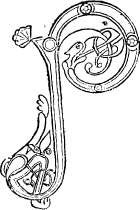
SECTION III.
Professional Men under the Brehon Law

ROFESSIONAL men next demand our attention, and of these especially the Brehons. The laws were administered in Ireland by brehons, so called while so engaged. It is not clear that there was in early times, as there was in later, a distinct order of men so engaged and not otherwise—judges and nothing else, and there is some reason for thinking that this was an after-growth. In the older manuscripts the words druid, bard, and brehon appear to be applied to the same persons interchangeably and as if synonymous.
The terms are, however, not synonymous, and never were, even when applied to the same person. One person being a very learned man might be all three; and probably this was so sometimes, and was always looked for in pre-Christian times. But, of course, its continuance was neither necessary nor possible. In some of the manuscripts it is said that legal jurisdiction was vested in the bards, the "just bards" are spoken of as custodians of the law, and the old law itself is called by a name which may be translated "Bardic Law." Further, a man who administered the law judicially, whether bard or druid or neither, is called a Breitheam or judge; genitive Breitheamhuin, pronounced Brehon (another instance of the adaptation to English of the genitive of a Gaelic word). Here we have three apparently different classes of men connected with the law in some way; but in what that connection consisted, and what were their mutual relations, or rather their actual distinctions, is not clearly stated.

